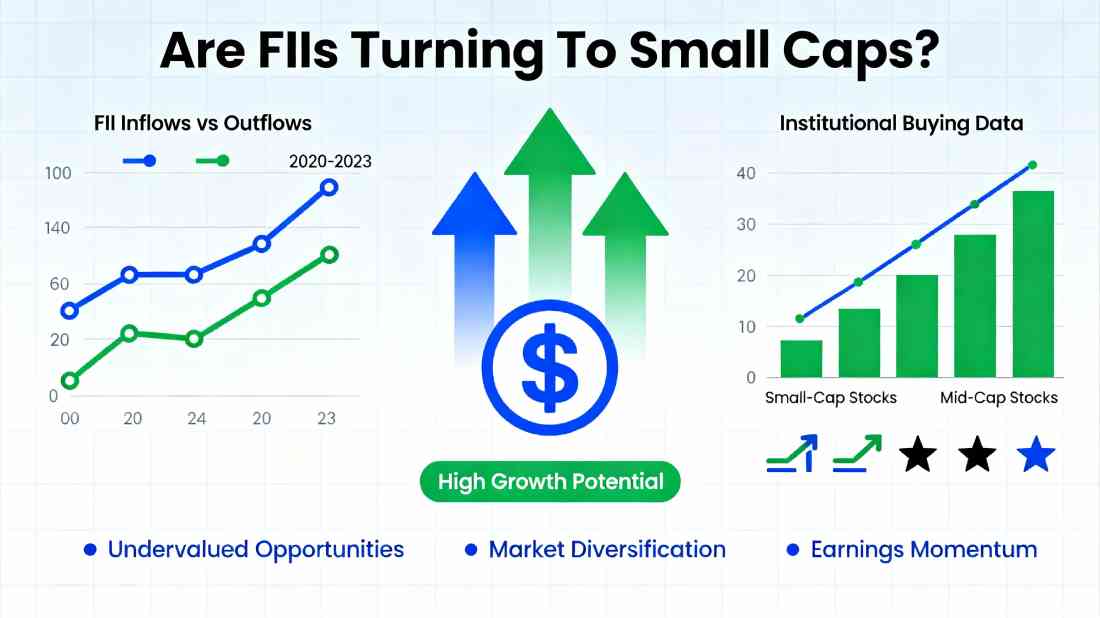Investors pay close attention to where the big players, in particular, the foreign institutional investors (FIIs) are going. The emerging query is: Are FIIs moving towards small-cap companies? In the article, we dissect this question, examine the evidence, comprehend the drivers and evaluate what it entails to you as an investor.
Table of Contents
What Does The Institutional Flow Data Show?
Looking at the latest institutional flow figures, it is evident that the overall mood among the FIIs has been cautious. To illustrate, the 30-day data indicate that net FII selling was Rs. 7000+ funds while the domestic institutional investors (DIIs) registered net inflows of Rs. 63,000+.
But even more interestingly, recent reports indicate that FIIs are boosting their investments in small-cap stocks. One report showed that they had loaded 292 small cap stocks, many of which were already ‘multi-baggers’.
Why Are FIIs Looking At Small Caps Now?
Several drivers explain this shift:
Higher Growth Potential
Small-cap firms tend to have comparatively greater growth potential than large and mature firms. This is appealing to FIIs churning for upside.
Valuation Arbitrage
When large-caps are highly valued, the FIIs may move to small-cap areas that are less explored and whose valuations are more modest and whose upside is higher.
Portfolio Diversification
The shift to small and mid-caps in a market dominated by large caps offers a way of diversification and a possible advantage.
Domestic Support & Policy Tailwinds
The structural reforms in India, concentration on manufacturing, revival of infrastructure and consumption can benefit smaller firms that can rapidly expand. These tailwinds may be awaited by FIIs.
But There Are Risks To Consider?
While interesting, this trend is not without caveats.
- Small-cap stocks are riskier in nature: less liquidity, greater volatility, and a track record.
- Although the holdings of the FIIs may increase, they can still have a small exposure compared to large caps.
- The small-cap stocks could already be over-run, and the fact that a company is FII-backed does not mean that the performance would be guaranteed in the future.
- Institutional flows can reverse quickly if global or domestic sentiment shifts.
What Should Retail Investors Do?
If you are a retail investor, what does this trend mean for you?
- Follow FII DII data today – analysing institutional buying into the small-cap segment may give hints.
- Don’t chase blindly. Use the FII buy/sell trend as a signal, not a guarantee.
- Concentrate on the basics – choose small-cap stocks with effective management, growth potential and a good balance sheet.
- Manage risk- do not allocate too much to small-caps, diversify and get ready for more volatility.
Key Takeaways
- FIIs are becoming more interested in small cap stocks, and your decision should be backed by several data points.
- The growth potential, structural domestic tailwinds, and valuation gaps are the impetus behind this trend.
- This trend can be wisely leveraged by retail investors; however, they need to be disciplined and manage their risks appropriately.
Conclusion
Foreign institutional investors are moving into small-cap markets. This is not just a headline; it shows that the way institutions operate in Indian markets is changing.
When you add this knowledge with strong stock selection and managed risk, then you might be in a better position to engage in the small-cap opportunity. Keep in mind: institutional support helps substantially, but your research is of primary importance.

